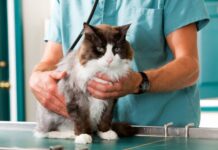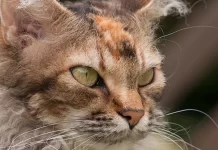Last Updated on August 18, 2023 by Fumipets
Why Do Cats Eat Plastic?
Cats chewing on plastic is a perplexing behavior that some feline owners observe. While the exact reason can vary, there are several theories that attempt to explain this behavior. One possibility is that cats are attracted to the texture and crinkling sound of plastic, which might stimulate their natural hunting instincts.
Another theory suggests that cats might be seeking certain chemicals or smells associated with plastic materials. Chewing on objects could also be a way for cats to explore their environment and alleviate boredom or anxiety.
However, plastic ingestion can be dangerous, leading to potential health issues, such as gastrointestinal blockages. It’s essential for cat owners to monitor this behavior and take steps to prevent their cats from chewing on plastic objects.
Why Do Cats Eat Plastic?
Why would a cat who gets three square meals a day want to eat plastic as well? It’s doubtful whether it tastes well. Perhaps cats who consume plastic are worried about global warming. After all, it’s better to consume plastic than to dispose of it in a landfill.
Although it’s unlikely that your cat is trying its best to recycle, some cats will eat plastic, whether it’s the covering on wires, plastic bags, or flip-flops, regardless of how much their owners tempt them with more appropriate treats. This behavior can be perplexing for owners.
Cats that eat plastic are displaying a risky behavioral drive termed pica, and the effects it may have can be life-threatening. It could seem like an amusing quirk or an unpleasant habit. Plastic that has been consumed may get trapped in the gut, necessitating immediate surgery. Chewing wires may cause burns or electrocution in cats. Fortunately, there are a few things you can do to permanently rid your beloved cat of this bad habit.
The Three Most Common Reasons Why Your Cat Is Eating Plastic
Three factors significantly affect behavior: your cat’s DNA, his health, and his upbringing. Siamese and Burmese cat breeds, for example, are more inclined to practice pica. Preventative actions should be performed to make sure that a cat who is purebred or who is a Burmese or Siamese hybrid doesn’t acquire pica.
Let’s now discuss your cat’s health. Cats can hold secrets. They are considerate beings who don’t always express their emotions clearly. Cats that display pica may be suffering from a variety of gastrointestinal issues, including inflammatory bowel disease, intestinal obstruction, inadequate nutrition, and intestinal parasites. Pain and discomfort are difficult to measure until the issue is severe. In other words, there might be a more serious health problem if your cat is eating plastic.
Finally, the events in your cat’s life may have an impact on his behavior. Your cat could eat things he shouldn’t if he’s agitated, undernourished, or irritated. If neglected, pica may develop into a compulsive behavior that often needs ongoing care, including medication.

How to Prevent Your Cat from Eating Plastic in the First Place
Take prophylactic action as soon as possible if your cat is a Siamese, Burmese, or a hybrid of these breeds; otherwise, he could begin this behavior before his first birthday. Keep your cat busy—it’s one of the finest things you can do to prevent pica.
Most cats have quite routine lives at home where they eat, spend time with you, and play with glittery balls. But since cats are such bright and inquisitive animals, boredom may result in problems as your pet searches for ways to occupy himself.
Offer your cat three different kinds of toys each day to improve its quality of life. Observe the toys he enjoys using before making a new style or color buy of those same toys. You can prevent him from becoming bored by learning what kind of toy he likes, then buying that one. Pick up and store any objects you don’t want your kitten or new cat to chew on to restrict his access.
How to Get Your Cat to Stop Eating Plastic
Take your cat to the clinic as soon as possible if he is already displaying pica. Talk to your vet about your cat’s nutrition and bowel movements, and be careful to bring up any other symptoms that might be unusual, such as vomiting or coughing. A physical examination and a fecal test will be performed by your veterinarian. She could suggest lab tests as well in order to get a more certain diagnosis.
Try the suggestions below to lessen pica if your cat is otherwise healthy, according to your veterinarian. Ask for a recommendation from a veterinary behaviorist if these suggestions and the trip to the clinic are ineffective. The American College of Veterinary Behaviourists has one available.
Enrich Your Cat’s Environment
Keep in mind that enrichment encompasses more than just toys. It consists of vertical space (resting spaces), concealing space, training, sensory stimulation, chew toys, and other items. Teach your cat some new tricks as another activity to keep him active. You may get your cat to stop bad behaviors by training him to come to you when you call. Decoding Your Cat and The Trainable Cat are two books that may teach you more about training.

Remove or Restrict Your Cat’s Access to Plastic
Close entrances to spaces with plastic-coated wires, pick up shopping bags and store any loose objects that can attract your cat. When you can’t watch your cat, you may even need to lock him in a room. If you decide to give your cat a room of his own, be sure it has access to food, water, a cozy bed, a window, and plenty of activities.
Offer Chew Toy Alternatives
Additionally, you should think outside the box and provide safe items that will resemble plastic in his mouth. This can include considering dog-specific chews or using unconventional thinking. Try freeze-dried or dehydrated meats or secure dog treats. Give him something you know is safe for him to chew on if that isn’t feasible.
As long as catnip doesn’t bother your cat, cat grass or catnip are excellent choices. To satisfy his need to use his mouth, you may also give him food and toys. There is no end to the variety of toys that drop food. Just bear in mind to introduce them to your cat gradually, ease him into the toy at first, and use his preferred goodies.
Use Bitter Sprays
If all else fails, spray things that are regularly chewed or may be chewed on with bitter-tasting liquids. Your cat may be discouraged by this, but it won’t stop him from chewing on the next untreated object he comes across. This strategy works well when combined with at least one other since it is impractical to attempt to spray everything you possess.
Questions & Answers:
Why do some cats chew on plastic?
Cats might chew on plastic due to their attraction to the texture, sound, or even the chemicals associated with plastic materials. It could also be a way to alleviate boredom or anxiety.
Is chewing on plastic harmful to cats?
Yes, chewing on plastic can be dangerous for cats. Ingesting plastic can lead to gastrointestinal issues, blockages, and other health complications.
How can I prevent my cat from chewing on plastic?
To prevent this behavior, ensure your cat has plenty of appropriate toys to engage with. Store plastic items out of reach, and consider using bitter-tasting sprays on items to deter chewing.
Should I be concerned if my cat occasionally chews on plastic?
Occasional chewing might not be a severe concern, but if it becomes a persistent behavior, you should address it. Consult your veterinarian if you’re worried about your cat’s plastic-chewing habits.
Can chewing on plastic indicate an underlying health issue in cats?
While occasional chewing might not indicate a health issue, excessive or compulsive chewing could be a sign of stress or dental problems. Consulting a vet can help rule out any underlying medical causes.
Please note that the answers provided above are based on general knowledge and understanding of cat behavior. If you have concerns about your specific cat’s behavior, it’s always a good idea to consult with a veterinarian for personalized advice.


















